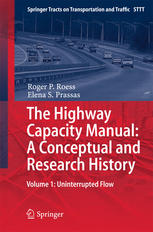

Most ebook files are in PDF format, so you can easily read them using various software such as Foxit Reader or directly on the Google Chrome browser.
Some ebook files are released by publishers in other formats such as .awz, .mobi, .epub, .fb2, etc. You may need to install specific software to read these formats on mobile/PC, such as Calibre.
Please read the tutorial at this link: https://ebookbell.com/faq
We offer FREE conversion to the popular formats you request; however, this may take some time. Therefore, right after payment, please email us, and we will try to provide the service as quickly as possible.
For some exceptional file formats or broken links (if any), please refrain from opening any disputes. Instead, email us first, and we will try to assist within a maximum of 6 hours.
EbookBell Team

4.8
44 reviewsSince 1950, the Highway Capacity Manual has been a standard used in the
planning, design, analysis, and operation of virtually any highway traffic facility
in the United States. It has also been widely used abroad, and has spurred the
development of similar manuals in other countries.
The twin concepts of capacity and level of service have been developed
in the manual, and methodologies have been presented that allow highway
traffic facilities to be designed on a common basis, and allow for the analysis of
operational quality under various traffic demand scenarios. The manual also
addresses related pedestrian, bicycle, and transit issues.
This book details the fundamental development of the concepts of
capacity and level of service, and of the specific methodologies developed to
describe them over a wide range of facility types. The book is comprised of two
volumes. Volume 1 (this book) focuses on the development of basic principles,
and their application to uninterrupted flow facilities: freeways, multilane
highways, and two-lane highways. Weaving, merging, and diverging segments
on freeways and multilane highways are also discussed in detail. Volume 2
focuses on interrupted flow facilities: signalized and unsignalized intersections, urban streets and arterials. It is intended to help users of the manual understand how concepts,
approaches, and specific methodologies were developed, and to understand the
underlying principles that each embodies. It is also intended to act as a basic
reference for current and future researchers who will continue to develop new
and improved capacity analysis methodologies for many years to come.